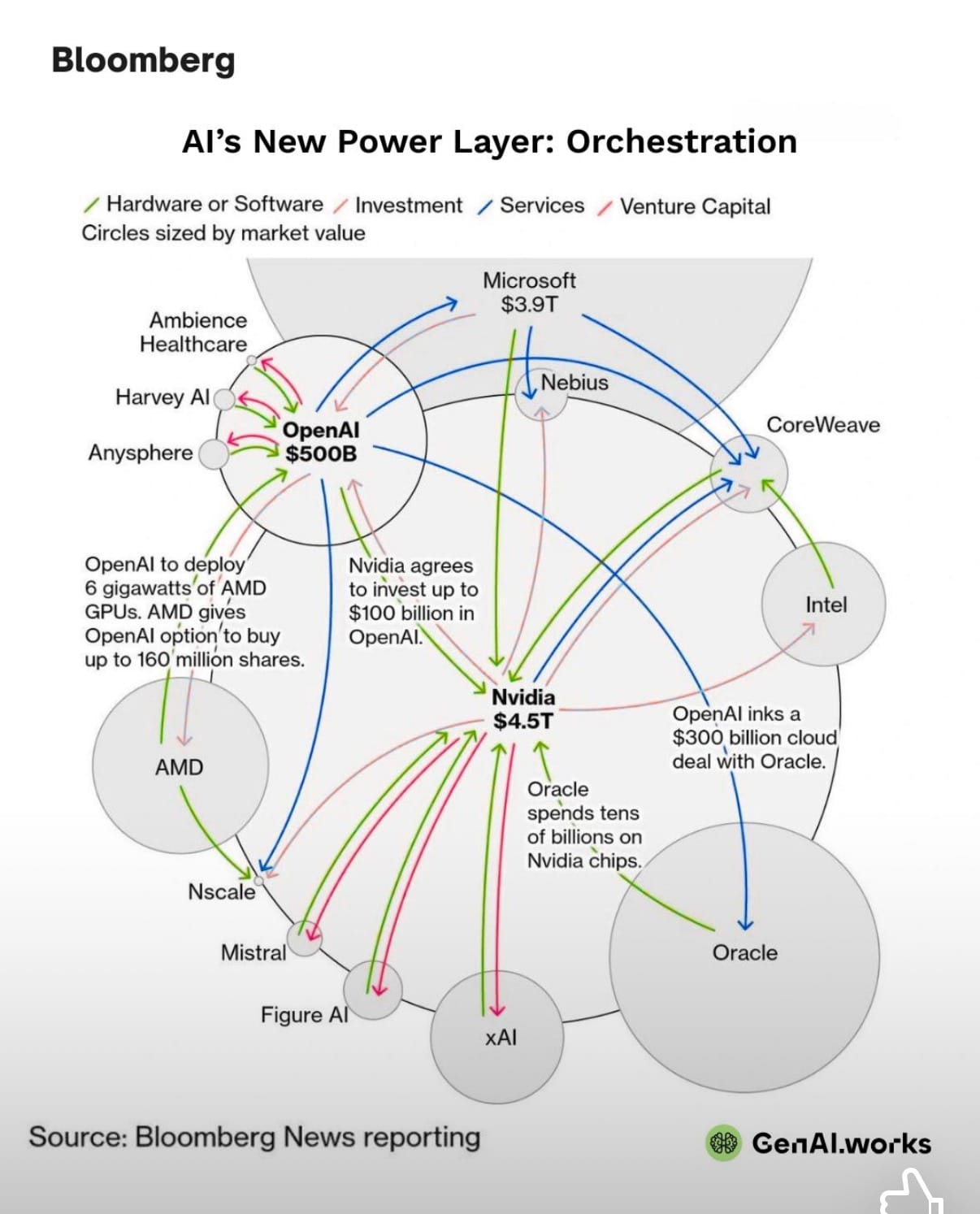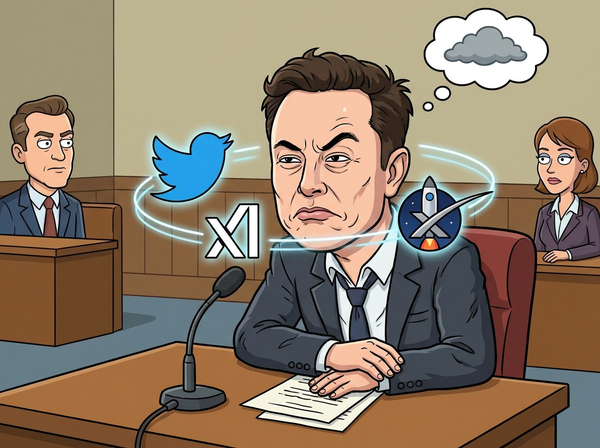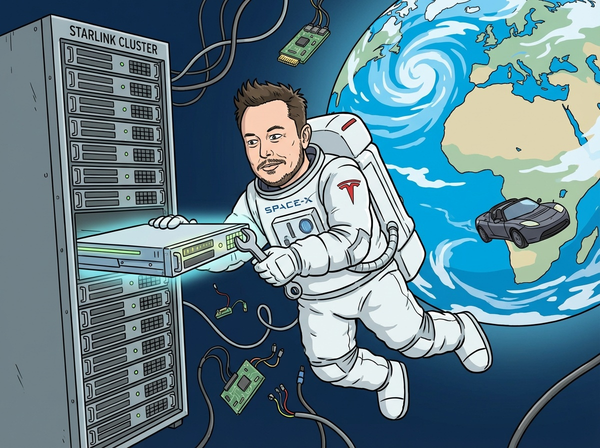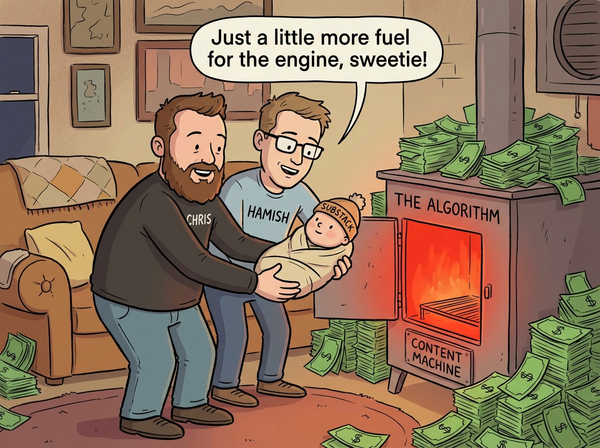More on the coming AI reckoning
OpenAI announced ChatGPT would allow erotica and companion-style interactions for verified adults. This feels like a Hail Mary

I know it was just a couple of days ago that I posted about the ginormous circle-jerk that is the current bout of AI funding:

The premise is that the main players, many members of the Magnificent 7[1] are increasingly entangled in the acceleration of the AI hype cycle.
Yes, OpenAI has 700M monthly users, but their growth is beginning to plateau. And, since their current monetization is reliant on either converting that 700 million monthly users to paid, or selling API[2] access to companies and individuals to leverage what are called the "foundation" models[3].
The problem is, that doesn't pay the bills. It is widely reported that OpenAI spends about $2.35 to generate each $1 of revenue. Thus the "we'll make it up in volume" is not a strategy.
One day, the VC's will stop shoveling dump trucks full o' cash will stop visiting OpenAI, and the OpenAI/Nvidia/AMD/Oracle round tripping train will come off the rails.
And when that happens, OpenAI is gonna need to generate real, profitable revenue.
Sidebar 1: A diversion
When the internet began to grow in the mid 1990's, there already existed services that were online repositories for community engagement, and information retrieval. They were giants like Delphi, Compuserve, and Prodigy. You paid them some nominal fee (I think I paid like $9.95 a month for Prodigy) and you got access via a dialup modem to a local POP (Point of Presence).
I got access to Usenet, and a lot of cool stuff. Sure, it was all text based, but it was like magic.
These companies made enough through these subscription fees to operate and maintain their network.
And in the pre-internet days, that was not a trivial investment.
But when the HTML standard dropped, and the infrastructure to the public internet started to be built out, anyone who had a modem, and a local ISP (Internet Service Provider) could get online.
Instead of the monthly subscriptions paying for the infrastructure of these communities, and repositories of data, they were just available to anyone who logged in via an ISP (like AOL), and "surfed". No walled garden. This was great.
But, publishing the content, or hosting a community took effort and, more importantly, money.
If people who wanted to access your cool page that chronicled every nuance of the Rush catalog and all their tours came from AOL, or any other ISP, they didn't have to pay you.
But you had to pay for your servers, your storage, and the bandwidth that was consumed to serve up your cool content.
Enter the concept of display ads.
Since the early 19th century, the advent of paid advertisements has allowed publishers to provide their content at a below cost unit price to their consumers. When I delivered newspapers in the late 1970's, a daily edition of the San Jose Mercury News was 15 cents. Clearly, the value of the paper, the ink, and the work to typeset, to do the original reporting, to edit it, and to compose the paper split by the distribution costs to individual subscribers was more than that.
What made this work was the sale of ad space, and the classified ads. That funded the journalists, the printing, the distribution of the paper, and turned a tidy profit for the publishers.
This was a long sidebar to describe how the early internet really kicked off the ad revolution. Remember that when you see an ad, someone paid for that, and that money that was paid to the site you are viewing allows you to see that site without having to pay subscription fees to a lot of services.
Back to our story in progress ...
In the past, Clammy Sam Altman has eschewed and belittled the idea of advertising revenue. Basically, he sniffs at the air like a true blue-blood at the idea of actually doing any "work". But that aloofness is beginning to crack, and there are hints that ChatGPT is beginning to look at how to increase revenues and look to becoming a business that can sustain itself.
Part of that is their urgent need to convert from a bizarre non-profit structure to a for profit entity (about $10B in funding is contingent on this conversion), and part of it is a desperation. ChatGPT may have oodles of users, but very few of them pay, and those who do pay, use more resources than their $20 or $200 a month cover.
One of my people at work uses ChatGPT all the time. I asked him if he had a "Pro" account, he guffawed and said: "Nah, I am just a free user". This dude is a power-user, he writes Python code that calls the API, uses the prompt box a lot, and generates images and even videos. All for free.
If he doesn't pay, given how heavily he uses it, and all the "slowing down" OpenAI does to encourage conversion to paid, it is unlikely that enough of those 700M users will decide to open their wallets.
And thus, OpenAI is looking to Advertising as a model. A lot of reasons why that is not likely to work, but there is one other path to success.
Sidebar 2: The other top revenue source on the internet
When I first joined Cisco in 2001, I learned that at the time, about 60% of the traffic on the internet was for adult content. Ok, it is pornography. And that is true today. In fact several of the top traffic sites are things like Pornhub. Pornhub makes a LOT of money. And apps like Grindr and similar are also very high traffic.
Traffic == eyeballs, and eyeballs == desirability for advertising. And also people who would never pay for a subscription to a Substack, or the NY Times will whip out that AmEx card for that porn account.
Back to the story, again
On Tuesday of this week, Sammy announced that they were going to start letting adults do adult things, and allow ChatGPT to be able to create erotica.
Gee, the internet is awash of wrapped models that already let people create erotica stories, and to do deep-fake porn vids too. Trust me, don't go searching for Swift Blowjob.
“In December, as we roll out age-gating more fully and as part of our ‘treat adult users like adults’ principle, we will allow even more, like erotica for verified adults,” Altman wrote in his post on X (formerly Twitter). The announcement follows OpenAI’s recent hint that it would allow developers to create “mature” ChatGPT applications once the company implements appropriate age verification and controls.
This feels a bit of desperation. Arstechnica follows it up with:
Altman explained that OpenAI had made ChatGPT “pretty restrictive to make sure we were being careful with mental health issues” but acknowledged this approach made the chatbot “less useful/enjoyable to many users who had no mental health problems.” The CEO said the company now has new tools to better detect when users are experiencing mental distress, allowing OpenAI to relax restrictions in most cases.
And of course, to become a "verified adult", you will not be surprised that you need to have a paid account.
How cheeky.
Anyhow, below is a video that does a good job explaining the desperation that OpenAI is displaying, and how the day of reckoning of the GenAI mania is growing near.
1 - The Magnificent 7 are what we used to call FAANG companies, but now they include Nvidia, and most of them are pivoting to go all-in on AI.
2 - API is Application Programming Interface. It is how to write software that uses another system to perform a function. OpenAI sells API access, and a LOT of the AI that you see integrated in apps like Office use this to integrate ChatGPT (or Anthropic's Claude, or Google's Gemini) to provide functionality. This often costs money.
3 - Foundation models are the big players. OpenAI's ChatGPT is the biggest player, followed by Anthropic's Claude, and then there are the also-rans. Products like Cursor are built around these Foundation models. They are what are called "Wrappers", and they pass a lot of their revenue to the companies that built the foundation models.





